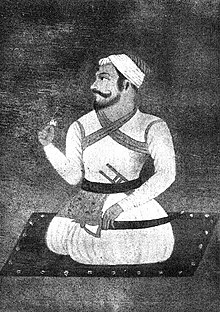| Shahaji Bhonsale | |
|---|---|
| Jagirdar | |
 | |
| Jagirdar of Pune in Bijapur Sultanate | |
| Predecessor | Maloji |
| Successor | Shivaji |
| Jagirdar of Bangalore in Bijapur Sultanate | |
| Predecessor | Position Created |
| Successor | Ekoji |
| Predecessor | Position Created |
| Successor | Sambhaji |
| Born | 18 March 1594[1] |
| Died | 23 January 1664 (aged 69) Hodigere, Bijapur Sultanate (present-day Karnataka, India)[2] |
| Spouse | Jijabai Jadhav Tukabai Mohite Chavan |
| Issue | Sambhaji Shivaji Ekoji Koyaji Santaji[3] Pratapji Bhivji Raibhanji Hiroji Farzand Makaji Anand Rao |
| House | Bhonsle |
| Father | Maloji |
| Religion | Hinduism |
| Occupation | Military leader |
Shahaji Bhonsale (Marathi pronunciation: [ʃəˈɦaːdʑiː ˈbʱos(ə)le]; 18 March 1594 – 23 January 1664) was a 17th century Indian military leader who served the Ahmadnagar Sultanate, the Bijapur Sultanate, and the Mughal Empire at various points in his career. As a member of the Bhonsle dynasty, Shahaji inherited the Pune and Supe jagirs (fiefs) from his father Maloji, who previously served the Ahmadnagar Sultanate. During the Mughal invasion of the Deccan, Shahaji joined the Mughal forces and served under Emperor Shah Jahan for a short period. After being deprived of his jagirs, he defected to the Bijapur Sultanate in 1632 and regained control over Pune and Supe. In 1638, he received the jagir of Bangalore after Bijapur's invasion of Kempe Gowda III's territories. Afterwards, he became the chief general of Bijapur and oversaw its expansion.[4]
Shahaji brought the house of Bhosale into prominence and was the father of Shivaji, the founder of the Maratha Empire. In the 19th and 20th centuries, the princely states of Tanjore, Kolhapur, and Satara were ruled by Shahaji's descendants.
- ^ "Shahaji".
- ^ A. R. Kulkarni (1996). Marathas and the Marathas Country: The Marathas. p. 15. ISBN 9788185016504.
- ^ Medieval India: From Sultanat to the Mughals Part - II, Satish Chandra, p.327 [1]
- ^ Farooqui Salma Ahmed (2011). A Comprehensive History of Medieval India: Twelfth to the Mid-Eighteenth Century. Pearson. p. 315. ISBN 9788131732021.